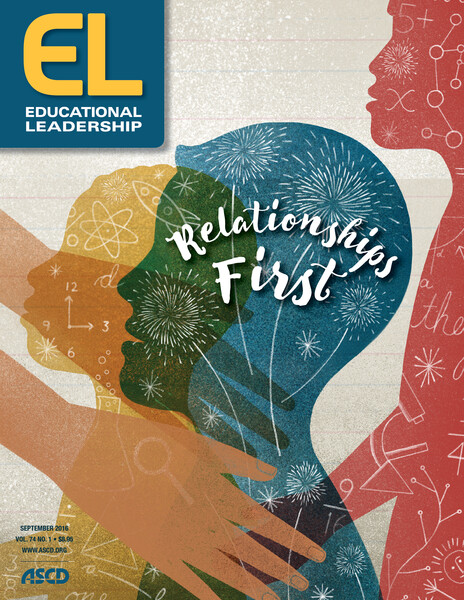September 1, 2016
•
5 min (est.)•
Vol. 74•
No. 1One to Grow On / Fox Taming and Teaching

From time to time, someone asks me what my favorite book is. I almost always pause. I know the answer, but there's something in me that thinks, "No, not that one. Choose something more 'appropriate' for an English teacher of 20 years." But the reality is that Antoine de Saint-Exupéry's The Little Prince (Harcourt, Brace & World, 1943) is my favorite. It has been my North Star in seeking to understand effective teaching. For me, it's the seed from which everything else about meaningful teaching grows.
You likely recall that it's the story of a little boy (really a man, and yet not) who is trying to find his way in a confusing world. At one particularly dismaying moment in his journey, he comes upon a fox in a meadow. In a short time, the Little Prince asks the fox to play with him—to enter his world. "I cannot play with you," says the fox. "I am not tamed."
The curious traveler asks what it means to be tamed. The response from the fox is important. He doesn't see "taming" as subjugating or controlling or subduing. "It means to establish ties," he says. The fox continues to explain that, at the moment, he's nothing special to the little boy and the little boy is nothing special to him—each is just another passerby to the other.
The fox says that everything will change if the boy tames him. They will be unique "in all the world" to each other. "We shall need each other," he says.
Then he pleads to the Little Prince, "Please—tame me," and adds, "One only understands the things that one tames."
Uncertain about the concept, the boy asks how he should go about taming the fox. The fox explains, "I shall look at you out of the corner of my eye, and you will say nothing. Words are the source of misunderstanding. But you will sit a little closer to me, every day."
As the story continues, the Little Prince tames the fox, but at some point the boy must move on, resuming the journey that is his to make.
"I shall cry," says the fox. The boy exclaims that taming the fox has done no good at all.
The fox shakes his head and says, "It has done me good," noting that he'll be happy whenever he sees the wheat fields—the color of the boy's hair.
The fox sends the Little Prince on a sort of field trip before he leaves—a well-timed moment that will help the boy understand what matters most in his world. When the boy returns, the fox shares a secret as a farewell present: "What is essential is invisible to the eye."
"What is essential is invisible to the eye," the Little Prince repeats so he will remember.
The fox adds, "You become responsible, forever, for what you have tamed."
As nearly as I can tell after 40 years of being a teacher and an observer of teachers, that's the essence of "real" teaching—the transformative kind that sends a young person forward on a journey they understand to be their own, eager to go and yet always looking back in gratitude—and for a bit of encouragement. It's about a teacher intending to see beauty—what is invisible to the eye—in the child who passes by. It's about knowing that establishing ties must start the learning journey and continue throughout it. It's about seeing the uniqueness of each child and helping the child see that uniqueness as well. And because we come to care about those we tame, it's about making sure the child learns about life as well as about math or science or art. Teaching, as The Little Prince suggests, is about relationships first.
Some contemporary research talks about "warm demanders," teachers who succeed with challenging students by seeing their possibilities, establishing trust, and helping them take positive control of their lives. John Hattie (2009) points to positive teacher-student relationships as one of the most potent catalysts for student achievement. Other researchers come to the same conclusion, naming it "teacher emotional support" (Allen, et al., 2013). In turn, the young person feels secure in taking the risk of learning.
Research affirms what the fantasy tale tells us. It all begins with relationships.
I like metaphors. It comes with the territory when you're an English teacher. I also know their limitations. At one point, I thought the Little Prince metaphor was a failure. After all, the fox was the teacher and the little boy was the student, yet it was the fox who asked to be tamed and the child who did the taming. It was the teacher who was sad when the child journeyed on rather than the child feeling wistful for a good and familiar place.
In time, I understood that one of the great satisfactions of teaching is that those of us who teach are the primary beneficiaries of the process. We are re-made each year with the passing through of each child. Each learner tames us as a necessary condition of our taming them. And although the world rarely rewards teachers commensurate with their impact, we have a very real wealth, which stems from having shaped young lives and having been shaped by those lives: the memories students leave with us as they move on. I'm OK with a bit of role reversal in the fox-taming business. I think the best teaching—and the best relationships—work that way.
References
•
Allen, J., Gregory, A., Mikami, A., Lun, J., Hamre, B., & Pianta, R. (2013). Observations of effective student-teacher interactions in secondary school classrooms: Predicting student achievement with the Classroom Assessment Scoring System—Secondary. School Psychology Review, 42(1), 76–98.
•
Hattie, J. (2009). Visible learning: A synthesis of over 800 meta-analyses relating to achievement. New York: Routledge.





